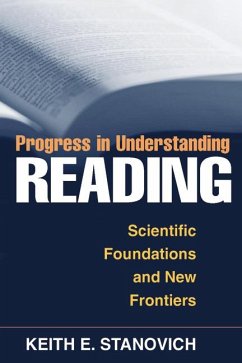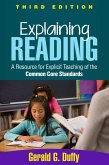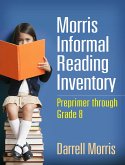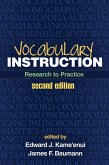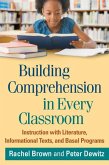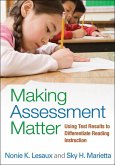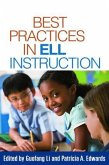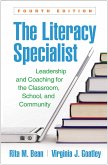- Broschiertes Buch
- Merkliste
- Auf die Merkliste
- Bewerten Bewerten
- Teilen
- Produkt teilen
- Produkterinnerung
- Produkterinnerung
From one of the most widely cited scholars in the field, this volume summarizes the gains that have been made in key areas of reading research and provides authoritative insights on current controversies and debates. Significant issues covered include phonological processes and context effects, the "reading wars" and how they should be resolved, and the meaning of the term "dyslexia".
Andere Kunden interessierten sich auch für
![Explaining Reading Explaining Reading]() Gerald G DuffyExplaining Reading37,99 €
Gerald G DuffyExplaining Reading37,99 €![Morris Informal Reading Inventory Morris Informal Reading Inventory]() Darrell MorrisMorris Informal Reading Inventory50,99 €
Darrell MorrisMorris Informal Reading Inventory50,99 €![Vocabulary Instruction Vocabulary Instruction]() Vocabulary Instruction43,99 €
Vocabulary Instruction43,99 €![Building Comprehension in Every Classroom Building Comprehension in Every Classroom]() Rachel BrownBuilding Comprehension in Every Classroom40,99 €
Rachel BrownBuilding Comprehension in Every Classroom40,99 €![Making Assessment Matter Making Assessment Matter]() Nonie K LesauxMaking Assessment Matter32,99 €
Nonie K LesauxMaking Assessment Matter32,99 €![Best Practices in ELL Instruction Best Practices in ELL Instruction]() Best Practices in ELL Instruction55,99 €
Best Practices in ELL Instruction55,99 €![The Literacy Specialist The Literacy Specialist]() Rita M BeanThe Literacy Specialist49,99 €
Rita M BeanThe Literacy Specialist49,99 €-
-
-
From one of the most widely cited scholars in the field, this volume summarizes the gains that have been made in key areas of reading research and provides authoritative insights on current controversies and debates. Significant issues covered include phonological processes and context effects, the "reading wars" and how they should be resolved, and the meaning of the term "dyslexia".
Produktdetails
- Produktdetails
- Verlag: Guilford Publications
- Seitenzahl: 536
- Erscheinungstermin: 21. April 2000
- Englisch
- Abmessung: 234mm x 157mm x 28mm
- Gewicht: 785g
- ISBN-13: 9781572305656
- ISBN-10: 1572305657
- Artikelnr.: 21381768
- Herstellerkennzeichnung
- Libri GmbH
- Europaallee 1
- 36244 Bad Hersfeld
- gpsr@libri.de
- Verlag: Guilford Publications
- Seitenzahl: 536
- Erscheinungstermin: 21. April 2000
- Englisch
- Abmessung: 234mm x 157mm x 28mm
- Gewicht: 785g
- ISBN-13: 9781572305656
- ISBN-10: 1572305657
- Artikelnr.: 21381768
- Herstellerkennzeichnung
- Libri GmbH
- Europaallee 1
- 36244 Bad Hersfeld
- gpsr@libri.de
Keith E. Stanovich , PhD, is currently Professor of Human Development and Applied Psychology at the Ontario Institute for Studies in Education of the University of Toronto. He is the only two-time winner of the Albert J. Harris Award from the International Reading Association for influential articles on reading. In 1995 he was elected to the Reading Hall of Fame as the youngest member of that honorary society. In 1996 he was given the Oscar Causey Award from the National Reading Conference for contributions to research, and in 1997 he was given the Sylvia Scribner Award from the American Educational Research Association. Stanovich is a Fellow of the American Psychological Association (Divisions 3 & 15), the American Psychological Society, and the International Academy for Research in Learning Disabilities, and is a Charter Member of the Society for the Scientific Study of Reading. He was a member of the Committee on the Prevention of Reading Difficulties in Young Children of National Research Council/National Academy of Sciences. He is the author or editor of two previous books.
Contents
Foreword, Isabel L. Beck
Preface
I. The Role of Context Effects in Models of Reading
1. Early Applications of Information Processing Concepts to the Study of
Reading: The Role of Sentence Context
2. Automatic Contextual Facilitation in Readers of Three Ages
Richard F. West and Keith E. Stanovich
3. Toward an Interactive Compensatory Model of Individual Differences in
the Development of Reading Fluency
4. The Interactive Compensatory Model of Reading: A Confluence of
Developmental, Experimental, and Educational Psychology
II. Phonological Sensitivity and the Phonological Core Deficit Model
5. Early Reading Acquisition and the Causes of Reading Difficulty:
Contributions to Research on Phonological Processing
6. Assessing Phonological Awareness in Kindergarten Children: Issues of
Task
Comparability
with Anne E. Cunningham and Barbara Cramer
7. Explaining the Differences between the Dyslexic and the Garden-Variety
Poor Reader: The Phonological-Core Variable-Difference Model
8. The Phenotypic Performance Profile of Reading-Disabled Children: A
Regression-Based Test of the Phonological-Core Variable-Difference Model
with Linda S. Siegel
III. Matthew Effects in Reading
9. Tying It All Together: A Model of Reading Acquisition and Reading
Difficulty
10. Matthew Effects in Reading: Some Consequences of Individual Differences
in the Acquisition of Literacy
IV. The Importance of Word Recognition in Models of Reading
11. The Word Recognition Module
12. Concepts in Developmental Theories of Reading Skill: Cognitive
Resources, Automaticity, and Modularity
V. The Cognitive Consequences of Literacy
13. Measuring Print Exposure: Attempts to Empirically Track Rich Get
Richer Effects
14. Exposure to Print and Orthographic Processing,
with Richard F. West
15. Does Reading Make You Smarter?: Literacy and the Development of Verbal
Intelligence
16. Literacy Experiences and the Shaping of Cognition, Stanovich,
with Anne E. Cunningham and Richard F. West
VI. Discrepancy Definitions of Reading Disability
17. Reading Disability Classification: Are Reforms Based on Evidence
Possible?
18. Discrepancy Definitions of Reading Disability: Has Intelligence Led Us
Astray?
VII. The Reading Instruction Debate: Comments on the Reading Wars
19. Putting Children First by Putting Science First: The Politics of Early
Reading Instruction
20. Romance and Reality
21. 25 Years of Research on the Reading Process: The Grand Synthesis and
What It Means for Our Field
Foreword, Isabel L. Beck
Preface
I. The Role of Context Effects in Models of Reading
1. Early Applications of Information Processing Concepts to the Study of
Reading: The Role of Sentence Context
2. Automatic Contextual Facilitation in Readers of Three Ages
Richard F. West and Keith E. Stanovich
3. Toward an Interactive Compensatory Model of Individual Differences in
the Development of Reading Fluency
4. The Interactive Compensatory Model of Reading: A Confluence of
Developmental, Experimental, and Educational Psychology
II. Phonological Sensitivity and the Phonological Core Deficit Model
5. Early Reading Acquisition and the Causes of Reading Difficulty:
Contributions to Research on Phonological Processing
6. Assessing Phonological Awareness in Kindergarten Children: Issues of
Task
Comparability
with Anne E. Cunningham and Barbara Cramer
7. Explaining the Differences between the Dyslexic and the Garden-Variety
Poor Reader: The Phonological-Core Variable-Difference Model
8. The Phenotypic Performance Profile of Reading-Disabled Children: A
Regression-Based Test of the Phonological-Core Variable-Difference Model
with Linda S. Siegel
III. Matthew Effects in Reading
9. Tying It All Together: A Model of Reading Acquisition and Reading
Difficulty
10. Matthew Effects in Reading: Some Consequences of Individual Differences
in the Acquisition of Literacy
IV. The Importance of Word Recognition in Models of Reading
11. The Word Recognition Module
12. Concepts in Developmental Theories of Reading Skill: Cognitive
Resources, Automaticity, and Modularity
V. The Cognitive Consequences of Literacy
13. Measuring Print Exposure: Attempts to Empirically Track Rich Get
Richer Effects
14. Exposure to Print and Orthographic Processing,
with Richard F. West
15. Does Reading Make You Smarter?: Literacy and the Development of Verbal
Intelligence
16. Literacy Experiences and the Shaping of Cognition, Stanovich,
with Anne E. Cunningham and Richard F. West
VI. Discrepancy Definitions of Reading Disability
17. Reading Disability Classification: Are Reforms Based on Evidence
Possible?
18. Discrepancy Definitions of Reading Disability: Has Intelligence Led Us
Astray?
VII. The Reading Instruction Debate: Comments on the Reading Wars
19. Putting Children First by Putting Science First: The Politics of Early
Reading Instruction
20. Romance and Reality
21. 25 Years of Research on the Reading Process: The Grand Synthesis and
What It Means for Our Field
Contents
Foreword, Isabel L. Beck
Preface
I. The Role of Context Effects in Models of Reading
1. Early Applications of Information Processing Concepts to the Study of
Reading: The Role of Sentence Context
2. Automatic Contextual Facilitation in Readers of Three Ages
Richard F. West and Keith E. Stanovich
3. Toward an Interactive Compensatory Model of Individual Differences in
the Development of Reading Fluency
4. The Interactive Compensatory Model of Reading: A Confluence of
Developmental, Experimental, and Educational Psychology
II. Phonological Sensitivity and the Phonological Core Deficit Model
5. Early Reading Acquisition and the Causes of Reading Difficulty:
Contributions to Research on Phonological Processing
6. Assessing Phonological Awareness in Kindergarten Children: Issues of
Task
Comparability
with Anne E. Cunningham and Barbara Cramer
7. Explaining the Differences between the Dyslexic and the Garden-Variety
Poor Reader: The Phonological-Core Variable-Difference Model
8. The Phenotypic Performance Profile of Reading-Disabled Children: A
Regression-Based Test of the Phonological-Core Variable-Difference Model
with Linda S. Siegel
III. Matthew Effects in Reading
9. Tying It All Together: A Model of Reading Acquisition and Reading
Difficulty
10. Matthew Effects in Reading: Some Consequences of Individual Differences
in the Acquisition of Literacy
IV. The Importance of Word Recognition in Models of Reading
11. The Word Recognition Module
12. Concepts in Developmental Theories of Reading Skill: Cognitive
Resources, Automaticity, and Modularity
V. The Cognitive Consequences of Literacy
13. Measuring Print Exposure: Attempts to Empirically Track Rich Get
Richer Effects
14. Exposure to Print and Orthographic Processing,
with Richard F. West
15. Does Reading Make You Smarter?: Literacy and the Development of Verbal
Intelligence
16. Literacy Experiences and the Shaping of Cognition, Stanovich,
with Anne E. Cunningham and Richard F. West
VI. Discrepancy Definitions of Reading Disability
17. Reading Disability Classification: Are Reforms Based on Evidence
Possible?
18. Discrepancy Definitions of Reading Disability: Has Intelligence Led Us
Astray?
VII. The Reading Instruction Debate: Comments on the Reading Wars
19. Putting Children First by Putting Science First: The Politics of Early
Reading Instruction
20. Romance and Reality
21. 25 Years of Research on the Reading Process: The Grand Synthesis and
What It Means for Our Field
Foreword, Isabel L. Beck
Preface
I. The Role of Context Effects in Models of Reading
1. Early Applications of Information Processing Concepts to the Study of
Reading: The Role of Sentence Context
2. Automatic Contextual Facilitation in Readers of Three Ages
Richard F. West and Keith E. Stanovich
3. Toward an Interactive Compensatory Model of Individual Differences in
the Development of Reading Fluency
4. The Interactive Compensatory Model of Reading: A Confluence of
Developmental, Experimental, and Educational Psychology
II. Phonological Sensitivity and the Phonological Core Deficit Model
5. Early Reading Acquisition and the Causes of Reading Difficulty:
Contributions to Research on Phonological Processing
6. Assessing Phonological Awareness in Kindergarten Children: Issues of
Task
Comparability
with Anne E. Cunningham and Barbara Cramer
7. Explaining the Differences between the Dyslexic and the Garden-Variety
Poor Reader: The Phonological-Core Variable-Difference Model
8. The Phenotypic Performance Profile of Reading-Disabled Children: A
Regression-Based Test of the Phonological-Core Variable-Difference Model
with Linda S. Siegel
III. Matthew Effects in Reading
9. Tying It All Together: A Model of Reading Acquisition and Reading
Difficulty
10. Matthew Effects in Reading: Some Consequences of Individual Differences
in the Acquisition of Literacy
IV. The Importance of Word Recognition in Models of Reading
11. The Word Recognition Module
12. Concepts in Developmental Theories of Reading Skill: Cognitive
Resources, Automaticity, and Modularity
V. The Cognitive Consequences of Literacy
13. Measuring Print Exposure: Attempts to Empirically Track Rich Get
Richer Effects
14. Exposure to Print and Orthographic Processing,
with Richard F. West
15. Does Reading Make You Smarter?: Literacy and the Development of Verbal
Intelligence
16. Literacy Experiences and the Shaping of Cognition, Stanovich,
with Anne E. Cunningham and Richard F. West
VI. Discrepancy Definitions of Reading Disability
17. Reading Disability Classification: Are Reforms Based on Evidence
Possible?
18. Discrepancy Definitions of Reading Disability: Has Intelligence Led Us
Astray?
VII. The Reading Instruction Debate: Comments on the Reading Wars
19. Putting Children First by Putting Science First: The Politics of Early
Reading Instruction
20. Romance and Reality
21. 25 Years of Research on the Reading Process: The Grand Synthesis and
What It Means for Our Field

